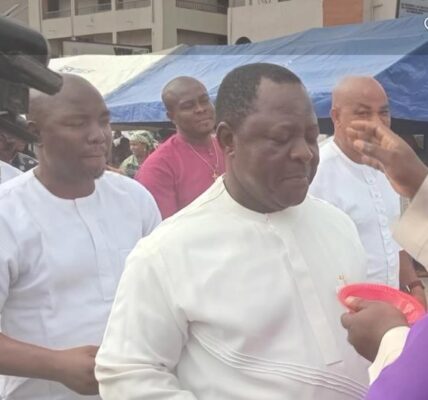A Rice production consultant in Thailand, Dr Li Yung, has advised the federal Ministry of Agriculture and Rural Development to dedicate a substantial part of the approved N60bn subsidy for rice farmers who suffered yield losses traced to floods and virus attacks recently to research.
In a telephone interview weekend, the expert argued that “What Nigerian farmers need now is not necessarily subsidy but research reports on challenges and prospects in local rice commercial production”.
“I have been hearing of rice backward integration in Nigeria for some time now, but nothing on research that should drive the process. That is why progress will continue to be limited.
“Like here in Thailand, it took us years of research before we come up with credible export quality which is now one of the key exports of our country.
According to him, “No amount of funding without continuous research will grow rice production to a sustainable export standard, and assured Thailand support if contacted in the process.
Business Hilights recalls that last week, the federal government approved the sum of N60bn as a subsidy for rice production in the country.
The Minister of Agriculture, Chief Audu Ogbeh, who dropped the hint Friday last week after the National Food Security Council ended its meeting at the Presidential Villa presided over by President Muhammadu Buhari.
Though the minister revealed that the subsidy was meant augment losses suffered by farmers due to floods, herders and virus attacks which hampered targeted yields, some of the framers who barred their minds on the development in an interview, suggested improvement in technology and research so as to align and raise the quality of products to global best practices.
They argued that giving them funds because of their losses cannot solve the problems but raising their farming techniques and management capabilities will make the difference otherwise, such allocation will become permanent.
Ogbeh stressed that “There is a subsidy programme coming up. The government has approved some money, N60bn, to support the rice industry to bring down prices. But, we are going to handle it differently.
“We don’t want to get into petroleum subsidy problem. So, a committee is looking at it with the Ministry of Finance.
“We think that it is better for us to loan money to the millers, farmers and distributors at a very low-interest-rate so that the capital doesn’t disappear and they have cheaper credit to do their business that should impact on the price of rice in the market.
“When we are ready, we will let you know.”
It would be recalled that a recent report by the United States Department of Agriculture (USDA), voided all the efforts so far made by the government, saying Nigeria was still a major importer of rice.
But the Kebbi State Governor, Atiku Bagudu, who also addressed journalists alongside the Minister said “At the meeting, we drew the attention of the Council to a report, which suggested that Nigeria had been importing rice to the tune of about three million tonnes.
“We informed the council that contact has been made with the US agency to tell us the basis for the report because it is not consistent with the report available to us.
“The only official importation in Nigeria is about 4,000 metric tonnes of rice.
Secondly, the biggest exporter of rice, Thailand, exported 1.1 million metric tonnes of rice to West Africa between January and October this year and India exported 402 million metric tonnes of rice to West Africa between January and the end of July this year.
“That is a total of 1.5 million metric tonnes.
“Even if all was smuggled into Nigeria, that was the total amount of importation one could attribute to Nigeria.”
But statistics gathered from Benin Republic revealed that over 95 per cent of rice imports in that nation have Nigeria as its final destination after all.
Out of this percentage, the combined efforts of the Nigerian Customs Service (NCS) and other border security agencies were able to track and impound a paltry 11 per cent meaning that the remaining 84 per cent of rice imported to Benin Republic find their way into the Nigerian markets up till now.
Further checks around major markets in Nigeria proved the findings as over 98 per cent of rice in markets are foreign when rice imports remained under control in Nigeria.









